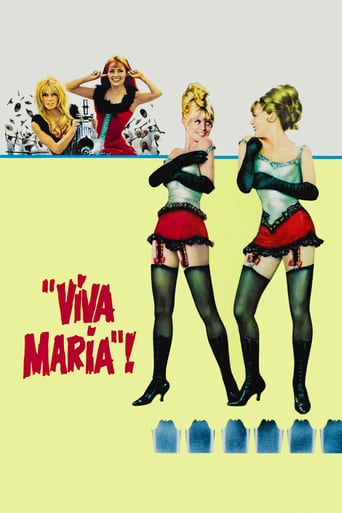writers_reign
Whilst it's true that inside every fat man is a thin man trying to get out the same thing doesn't apply to every big-budget movie but in this case it does. It seems evident that once Louis Malle had secured the services of Moreau and Bardot they financiers kept throwing money at him and demanding a bigger movie than the traffic would bear. Apparently Malle had seen and admired Vera Cruz and thought it might be fun to substitute two gals for Gary Cooper and Burt Lancaster and who knows, he may have been right. As it stands we'll never know and we are left with an uneven film with a fine performance from Paulette Dubost, a non-performance from George Hamilton and not much chemistry between the two leads. I don't know about you but I've had it up to here with 'revolution' movies set in South America so it already had one strike on it before I took my seat. I managed to sit through it and though I admire the Malle of Milou en Mai, Au Revoir, Les enfants, Zazie dans le metro etc I won't be looking for the DVD of this one.
bamptonj
VIVA MARIA, a French-Italian co-production, is set in the revolution-torn Mexico in the early 1900s. Maria (Brigitte Bardot) - the daughter of an IRA operative - journeys to Mexico and meets up with her namesake Jeanne Moreau. Under the guise of circus/vaudevillian entertainers, they pursue their revolutionary activities around the countryside. The illustrious pair are captured but escape to fight with an enthusiastic peasantry to free San Miguel from its Spanish oppressors. Thoroughly entertaining and rollicking fun with spectacular visual action. Most of the film was shot on location in Mexico and the railway scenes filmed authentically on the 3ft gauge Interoceanic division of National Railways of Mexico. The featured steam loco is G-023 class 2-8-0 No. 66 (Alco 5209).
TM-2
I remember staying up late one night and watching this movie when I was about 13. Here was two stunning women that demanded attention. The movie was all about entertainment. Saw it 20 years later and still enjoyed it. This is a pleasant change from the regular diet of 100 lb anorexic female leads we get to 'drool' over.
ROMANVS
I originally saw Viva Maria! at a Toronto cinema in the mid-1960s in the company of three college friends and, upon emerging, I think that each of us would have cheerfully enlisted in a revolutionary cause of the kind depicted in the film. The Moreau-Bardot magic was irresistible! As I recall, the North American release of this film ended with the cheers of the crowd of San Miguel as the circus troupe departed. On a recently acquired laserdisc pressing of the film, however, I note that there is an extra minute -- the European ending in which the troupe returns to the European stage.Pay particular attention to the musical score -- composed by Georges Delerue (1925-1992), most of whose work was for the European cinema but he was, from time to time, commissioned to compose for American and British films. He had a particular talent for evoking the nostalgic longing inherent in mediæval and renaissance themes. In fact, in a radio interview, Delerue once indicated that, where most film composers would start to experiment with tunes on a battered piano, he would often wander into archives of ancient music to get his inspiration. In the opening credits to Viva Maria!, a French ballad of the young heroine is picked up by the orchestra in a delightful example of Delerue's skill. (By the way, the film's credits do not seem to name the singer, but whoever he is, the man's diction is so clear that even an anglophone "retard" ought to be able to follow the French lyrics. If anyone knows who he is, I would be pleased to learn his identity.)




